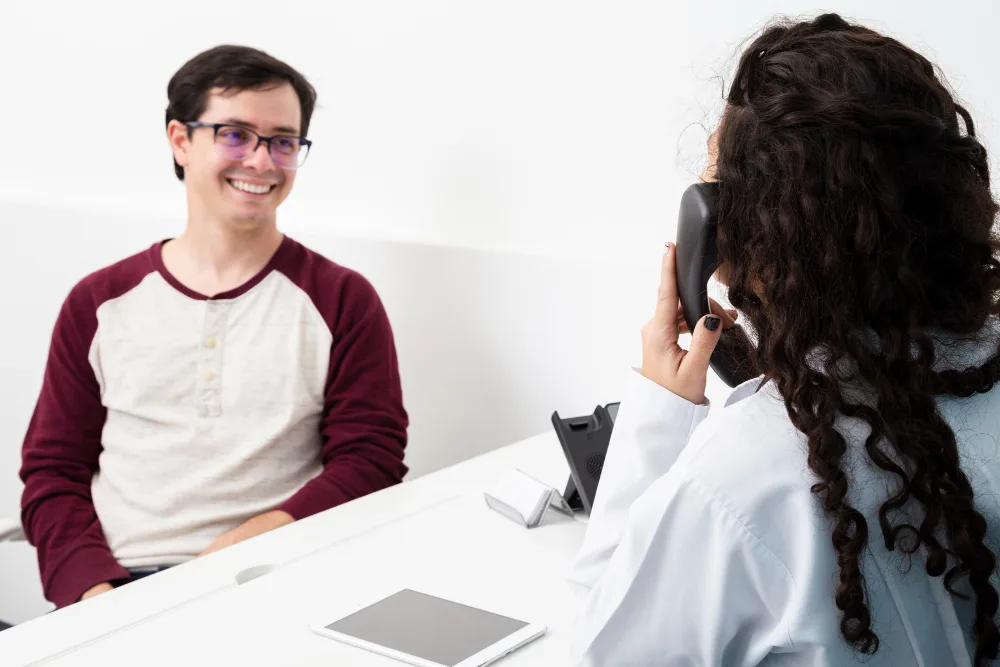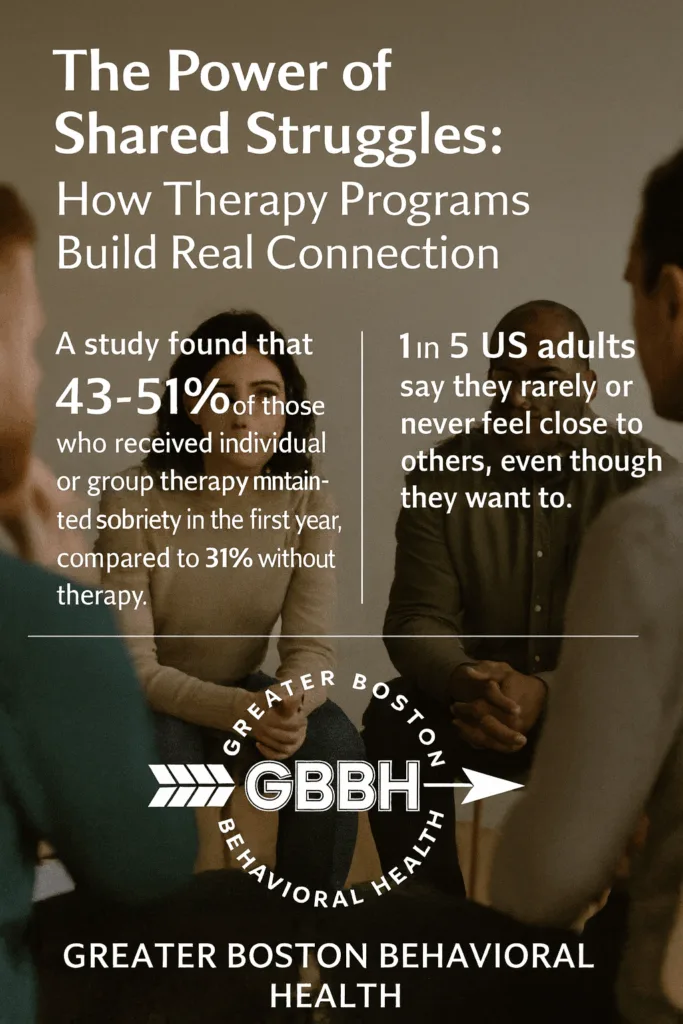Even in a room full of people, early recovery can feel like a private ache. You show up. You do what you’re told. But inside, there’s this low hum of loneliness that doesn’t go away just because you stopped drinking or using. For many, it gets worse before it gets better.
But here’s what we’ve seen at Greater Boston Behavioral Health: when people stop hiding, they start healing. And often, that starts in therapy programs—especially the kind built on connection, not just conversation.
Let’s talk about why group-based therapy can be the thing that changes everything… even if you’re not sure you’re ready.
Why Is Early Recovery So Lonely?
Because you’re feeling everything—and sharing none of it.
Sobriety doesn’t just strip away substances. It can strip away your routines, your social circle, even parts of your identity. Suddenly you’re left with all the feelings you used to push down—and no one who really understands what they’re like.
The people who do care might be friends or family who haven’t been where you are. They want to help—but they don’t get it. And the people who do get it? Maybe you haven’t found them yet.
That’s where therapy programs come in—not to give you more coping skills (though they will), but to give you access to something even more essential: being known.
What Makes Group Therapy Different From Just Talking to Friends?
Group therapy isn’t about complaining or venting. It’s about breaking the silence in a space where people actually understand.
It’s one thing to tell your friend, “I had a rough night.”
It’s another to say it in a room where someone looks up and says, “Me too.”
In our therapy programs in Boston, we see this kind of moment every day. The shift from “I’m alone in this” to “Oh. Maybe I’m not.”
Unlike casual conversations, group therapy is structured and facilitated by professionals who keep the space safe. It’s not a free-for-all. It’s intentional. And when done right, it’s deeply healing.
Can Therapy Programs Actually Help With the Loneliness?
Absolutely. But not in a forced “just go make friends” kind of way.
Therapy programs offer ritual and rhythm—you show up at the same time, with the same people, in the same place. That consistency becomes its own kind of safety. You start to look forward to seeing familiar faces. You start to care about their progress. And they care about yours.
One client told us,
“I didn’t think I needed group. But by week three, I realized I hadn’t laughed—like really laughed—in months.”
– Outpatient Client, 2023
You don’t need to be extroverted. You don’t need to spill your guts. Just showing up is enough to start softening the edges of isolation.
What If I Don’t Fit In?
Here’s a secret: almost no one feels like they fit in at first.
In early recovery, the brain is constantly scanning for rejection. You walk into a room and think, “They’re further along than me. They don’t want me here.” But most of the time, they’re thinking the same thing about you.
Group therapy works because it doesn’t require sameness. It honors difference—and finds common ground in the emotional weight we all carry.
Whether you’re in Needham, Newton, or Dedham, Greater Boston Behavioral Health offers therapy programs that bring together people from all walks of life. Recovery doesn’t care what you do for work, what you look like, or how you got here. It only asks that you stay open.
What If I Don’t Want to Talk?
That’s okay. Silence is allowed.
In early sessions, many people just listen. And that’s healing too. Hearing someone else put words to what you’ve been feeling can be just as powerful as saying it yourself.
Facilitators at Greater Boston Behavioral Health never pressure clients to share before they’re ready. Some of the most powerful moments come when someone finally speaks up after weeks of quiet—and the group leans in, not away.
How Do Therapy Programs Actually Build Lasting Bonds?
It’s not about finding your new best friend. It’s about building real trust, one shared truth at a time.
When someone in group says, “I messed up this week,” and the room doesn’t flinch—that’s a moment of safety. When someone cries without apology, and no one tries to fix it—that’s emotional permission. These moments matter. They teach your nervous system it’s safe to stay. To be real.
Over time, these shared experiences build something surprisingly durable. Many alumni of our therapy programs still meet up or check in years later—not out of obligation, but out of earned connection.
Is Individual Therapy Better Than Group?
Not better—different.
Individual therapy offers a quiet, private place to dig deep. Group therapy gives you community, perspective, and the deeply human realization that your shame isn’t unique.
The most effective therapy programs combine both. At Greater Boston Behavioral Health, our clinicians help you figure out the right mix of group and individual work based on your needs—not a one-size-fits-all model.
FAQ: Therapy Programs and Building Connection in Recovery
What if I open up and regret it?
Therapy programs are facilitated by trained clinicians who create boundaries, model respect, and help guide emotional safety. You can share at your own pace. And if you ever feel vulnerable afterward, that’s a conversation worth having—with the group or your individual therapist.
Can therapy help even if I’m not sure what I need?
Yes. Many people start therapy with a vague sense of discomfort, confusion, or emptiness. You don’t need to have a diagnosis or a crisis to benefit. Sometimes the first breakthrough is just saying, “I don’t know why I feel this way”—and realizing you’re not alone in that.
Are there virtual group options if I’m not ready to come in?
Yes. We offer both in-person and telehealth therapy programs to meet people where they are. Virtual groups follow the same structure and confidentiality as in-person sessions, and they can be a powerful stepping stone for those who feel safer starting from home.
What kinds of therapy groups do you offer?
We offer a variety of therapy groups in Boston and surrounding areas, including:
- Early recovery groups
- Trauma-informed therapy
- Anxiety and mood regulation groups
- Co-occurring disorder support
- Process groups focused on connection and identity
Whether you’re looking for therapy programs in Dedham, MA or Newton, MA, we have options that prioritize emotional safety and real connection.
What if I join and decide it’s not for me?
That’s okay too. We’ll help you explore other therapy formats, connect with a different group, or focus more on one-on-one support. The most important thing is that you feel safe and supported—wherever that happens.
You’re Not Broken for Feeling Lonely
You’re not weak. You’re not behind. You’re not broken for feeling empty in early recovery.
You’re just human. And you’re waking up to your own feelings for the first time in a long while. That’s sacred, even when it’s painful.
Therapy programs aren’t a cure-all. But they’re one of the few places where the masks can come off—and what’s underneath is actually welcome.
Ready to feel a little less alone? Call (888) 450-3097 or visit to learn more about our Therapy Programs services in Boston, Massachusetts.


